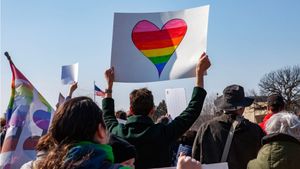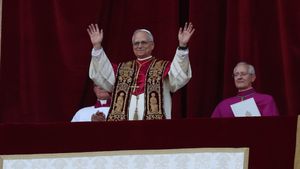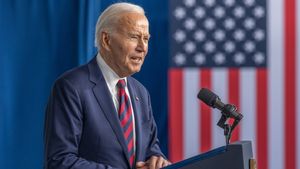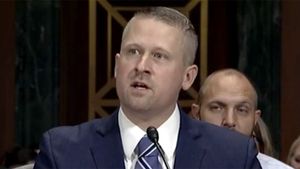Over the last several years, the sanitized legacy of civil rights leader Martin Luther King Jr. has been challenged. New books and essays assert that if he is worth remembering, his politics (and his life) are worth serious engagement and critique. At the same time, our attention has moved, justifiably so, to Bayard Rustin, the gay, socialist organizer and King confidante whose legacy is enjoying its own revival, most recently through a new interview from 1986. Like King, however, some contemporary invocations of Rustin risk falling into the trap of sanitizing both his political and personal life. The sooner we come to terms with the complexities of our historical figures, the more instructive their legacies will become for us.
There is no question that Rustin was utterly audacious during a time when being neither gay nor socialist were exactly fashionable. A brilliant organizer and tactician, the reasons to cite him are many. Not only did he urge King to lean deeper into the politics and practice of nonviolence, but he was also an unabashed pacifist who was jailed for two years for refusing to enter the draft during World War II. And in addition to organizing the 1963 March on Washington, three years later he and labor leader A. Philip Randolph devised an ambitious plan to end poverty in the United States.
This legacy was also peppered with efforts to personally destroy him. He had the distinct honor of being in the crosshairs of the FBI (an accomplishment that befell so many civil rights leaders of the period) and some of his own movement colleagues threatened to plant false stories that he and King were having an affair in order to get him to step down as a lead organizer. Truly, any account that points to Rustin's legacy will have to confront all of this.
But Rustin should be remembered for less than celebratory reasons as well. For instance, Rustin took a dramatic turn in 1965 against the idea of mass political action. Many believed he was abandoning the protest tradition to embrace the Democratic Party, a choice for which he was labeled a "traitor" by younger activists who had little faith in this new strategy.
Having led one of the most successful mass demonstrations of the century only a few years earlier, Rustin had gone too far in the opposite direction by hedging his bets on the idea that Black people would be welcomed by the same establishment that only embraced them in part.
Or how by the mid-1980s, Rustin came to believe -- quite problematically -- that, since Black people, with the passage of the Civil Rights Act, had policies to protect them, the gay liberation movement was the next phase in the "struggle for human dignity." The impulse was right -- that queer life should be protected under law -- but the framing was wrong. It failed to capture, for example, that at the height of the AIDS crisis in the 1980s, black gay men were feeling the brunt of the crisis as much, if not more than, other demographic groups.
To his credit, Rustin led the push to get the NAACP to dedicate time and resources to the crisis. Still, in separating Black and gay liberation, Rustin betrayed the emerging consensus ascendant in Black feminist organizing spaces -- that oppressions were not things to be ranked in order of importance but rather addressed in light of how they intersect and compound on one another.
Approaching Rustin as this complicated figure will cause anxiety I'm sure, especially among people who think holidays celebrating the legacy of mass movements are reserved for uncritical praise of the people who led them. We should reject this idea. Whatever insights we might gain by turning to progressive figures like Rustin, their legacies should matter because they are very far from gods.
Why, then, should we draw on Rustin today at all? One reason is that he instructs us and our own struggles to juggle the personal and the political. Reading the histories of Rustin, I can't help but wonder if his struggle to find the right language to talk about the relationship between Black and gay liberation was really about finding his footing on the shifting terrain underneath him. The challenge to be alert to multiple vulnerabilities at once and keep track of one's personal location in social movements is not just an artifact of an earlier time, however -- something vibrant and exciting movements for racial and queer liberation are displaying today.
America has a tendency to selectively remember its historical past. Rustin often appears in the contemporary imagination oddly diminished by the outsized attention given to his status as an openly gay man in the Civil Rights Movement. This betrays the necessary, albeit messier, work of using his complicated legacy to genuinely strive for intersectional politics in our own time.
"The only way I could be a free whole person was to face the shit," Rustin says in the interview. I can only imagine that the authority and self-possession with which he speaks about being Black and gay is something one only attains from enduring -- failing, to be sure, but enduring nonetheless. Rustin was genuinely wrestling with how to translate his identities into a broader political message and found it important to not "aid and abet" all the prejudices and systems that were trying to destroy him. I can almost hear him asking us if we will do the same.
Jared Loggins is a writer and Ph.D. candidate at Brown University. He is co-authoring a book on Martin Luther King Jr.








































































